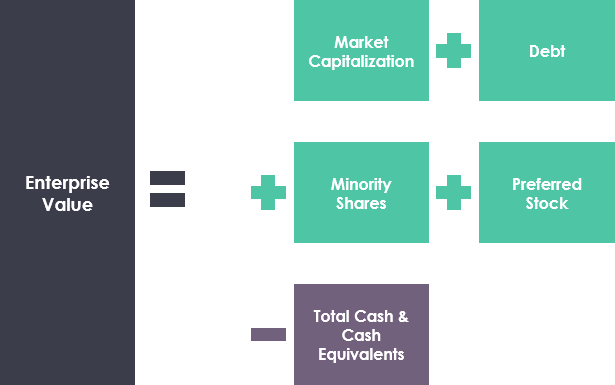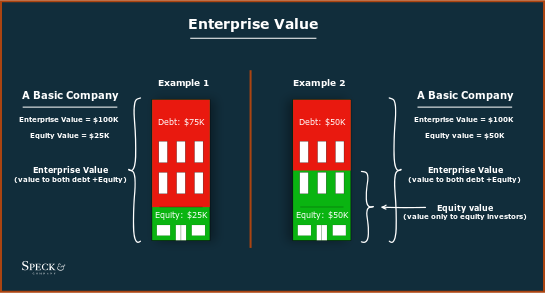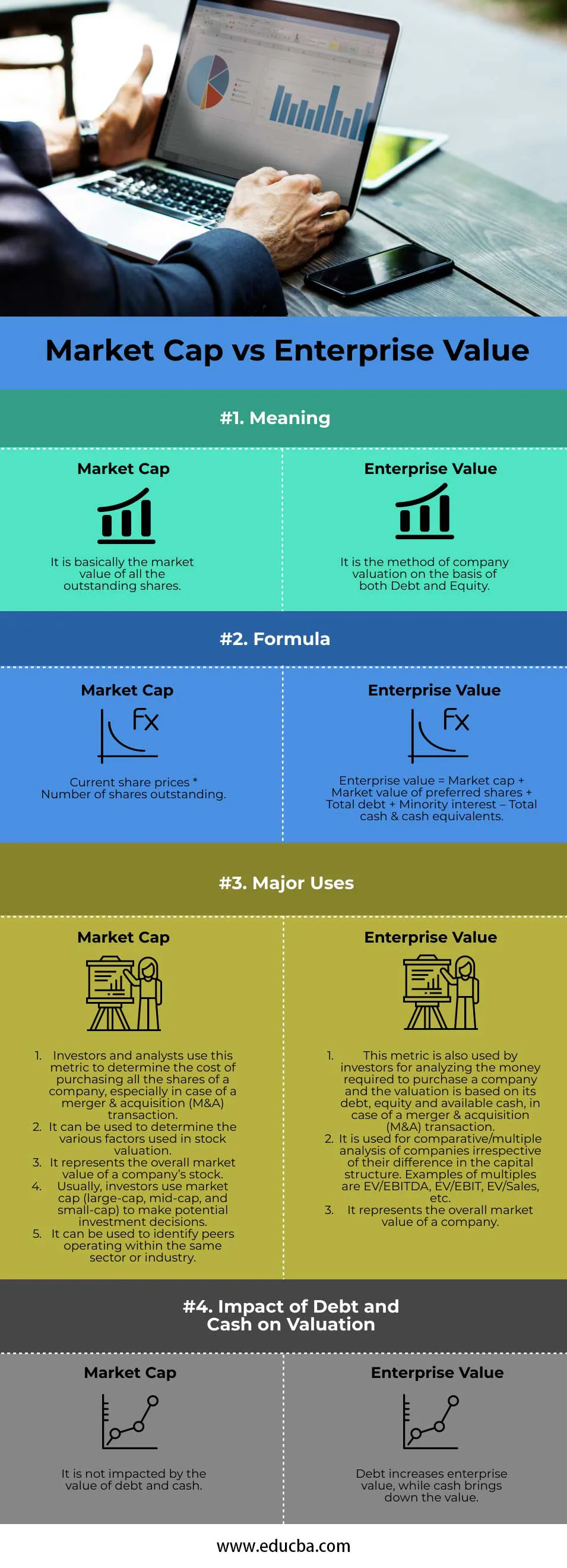The worth of every company can be calculated in monetary terms. This value is used by analysts and investors alike to assess whether the company is worthy of investment or not. Moreover, the company’s value plays a vital role in ratio analysis. One of the many metrics through which a company can be valued is enterprise value. Let’s understand what it means!
- The enterprise value is the aggregate financial value of a company.
- It is calculated by adding together the market capitalisation and total debt. Any cash or equivalent is deducted from the total to arrive at the value.
- The enterprise value is used to assess the financial worth of a company against the EBITDA.
- Enterprise value, market value and equity value are different values which cannot be used interchangeably.
What is Enterprise Value (EV)?
In simple terms, enterprise value or EV is the overall financial valuation of the company.
It is a comprehensive assessment of the company’s value, including its capital and debt financing. Moreover, the cash and cash equivalents and any minority interest, if applicable, are also reflected in the company’s enterprise value.
What are the components of Enterprise Value?

The enterprise value is calculated by adding up the different elements of the balance sheet. They comprise the components of the EV, which are as follows –
- Market capitalisation
Market capitalisation is the current value of the company’s outstanding shares. In other words, the value of the shares held privately or publicly is called market capitalisation. It is calculated as follows –
Market capitalisation = Number of outstanding shares * Market price of the shares
- Debt
All types of short-term and long-term debt are added together when calculating the enterprise value. These include creditors, bonds, debentures, loans, etc., that the company might have taken.
- Minority interest
If the company’s subsidiary holds 50% or more shares, the subsidiary company would be called the minority interest. The value of such minority interest would also be included in the EV calculation.
- Any unfunded pension liability
A company might have outstanding pension liability payable to retired employees. Alternatively, the company might have invested in an unfunded plan to set aside regular amounts toward a pension corpus. If that is the case, the unfunded pension liability is included in the enterprise value calculation.
- Cash and cash equivalents
The cash balance that the company has is considered. Cash equivalents include assets which can be readily converted to cash. Examples include money market instruments, demand drafts, treasury bills, etc.
Why is enterprise value used?

The enterprise value of a business is used to assess its worth. For other businesses considering acquiring a company, the EV helps them estimate the acquisition cost.
For investors and stakeholders, the enterprise value is a more realistic assessment of a company’s worth than its market capitalisation.
If the enterprise value turns out to be negative, it may depict that the company’s cash or cash equivalents are too high to overtake its equity and debt values combined. It may also imply that the company needs to leverage its assets correctly or sit on too much liquidity, which can hamper growth and profitability.
The enterprise value is also used in financial and ratio analysis. It can be used to assess the company’s EBITDA (Earnings Before Interest, Tax and Depreciation). On the other hand, the EBITDA is used in multiple ratios to judge the company’s revenue and profit-generating potential. Thus, overall, the enterprise value is an important financial metric for assessing the company and its value.
Enterprise value vs market cap

Compared to market capitalisation, the enterprise value gives a clear and more accurate company valuation. It is because the EV considers a business’s debt and cash balance besides the market capitalisation. As such, it has a more holistic approach.
Take the example of two companies, A and B, both of which have a market capitalisation of Rs. 400 cr. Now, while both companies look to have similar worth, the picture becomes clearer if the enterprise value is used. Say Company A has a debt of Rs. 50 cr. and cash and cash equivalents of Rs. 25 cr. Similarly, Company B has a debt of Rs. 75 cr. and cash and cash equivalent of Rs. 20 cr.
The EV of both these companies would be calculated as follows –
| Company A | Company B | |
| Market capitalisation | Rs. 400 cr. | Rs. 400 cr. |
| Debt | Rs. 50 cr. | Rs. 75 cr. |
| Cash and cash equivalents | Rs. 25 cr. | Rs. 20 cr. |
| Enterprise value | Rs. 400 cr. + Rs. 50 cr. – Rs. 25 cr. = Rs. 425 cr. | Rs. 400 cr. + Rs. 75 cr. – Rs. 20 cr. = Rs. 455 cr. |
While both Company A and B have similar market capitalisations, the calculation shows company B to be more valuable compared to company A as per the enterprise value.
Enterprise value vs equity value
The equity value is the same as the market capitalisation. It calculates the current value of the company’s equity shares that are outstanding, i.e., issued by the company to its shareholders. The equity value does not include the value of debts or cash and cash equivalents.
As such, the equity value gives a restricted assessment of a company’s worth compared to the enterprise value.
EV formula and calculation
The enterprise value formula is simple. As explained below, it adds up the market capitalisation with the debt and deducts the cash and cash equivalents from the total.
Enterprise value = market capitalisation + debt – cash and cash equivalents
To understand how to calculate enterprise value, let’s use an example. Say a company’s market capitalisation is Rs. 100 cr. The company has taken a long-term debt valuing Rs. 20 cr. It has a short-term loan of Rs. 10 cr. The cash and cash equivalents of the company also stand at Rs. 4 cr.
In this case, the enterprise value calculation is as follows –
= Rs. 100 cr. + Rs. 20 cr. + Rs. 10 cr. – Rs. 4 cr.
= Rs. 126 cr.
Conclusion
Enterprise value gives the overall worth of the company and helps investors and potential buyers assess whether the business is worth investing in or not. The enterprise value can be calculated through a simple formula, giving a better assessment of a company than its market capitalisation. So, know the enterprise value meaning and calculate the value of the business you want to invest in.



